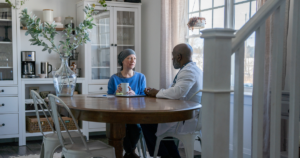The Best Fluffy Pancakes recipe you will fall in love with. Full of tips and tricks to help you make the best pancakes.
How to Become an Oncologist: Step by Step Guide

The diagnosis, management, and prevention of cancer are the main goals of the medical specialty known as oncology. Oncologists are medical specialists who focus on treating cancer patients. They have made important advances in both cancer research and patient care.
Why Do You Want to Work in Oncology?

A career in oncology can be quite fulfilling. It presents the chance to positively influence patients’ lives by supporting them in their fight against cancer. The potential of the discipline is also continuously being expanded by improvements in oncology research and therapies.
How to Become an Oncologist
Academic Prerequisites: Getting Ready for High School
Start by doing well in your high school classes, especially in maths, science, and biology. Participate in extracurricular activities or join science clubs to show your dedication to science and healthcare.
University education
Obtain a bachelor’s degree in a field that is relevant to your situation, usually biology, chemistry, or pre-medical studies. Maintain a good GPA and, to gain experience, take part in volunteer or internship programs in healthcare environments.
Admission to Medical School
Apply to medical schools and pass the Medical College Admission Test (MCAT). Being academically strong and having an attractive extracurricular resume is essential because admission to medical school is extremely difficult.
Medical College: Curriculum Core
A demanding curriculum covering a range of medical disciplines is part of medical school. Pay particular attention to cancer-related topics and look for electives that have an oncology focus.
Clinical Residency
Learn about various medical disciplines, such as cancer, while you are completing your clinical rotations. Your interest in the field will be better gauged by this practical experience.
Courses in Specialised Oncology
Specialized oncology courses are available at some medical colleges. Enrolling in them can give you useful knowledge and skills pertaining to the treatment of cancer.
Residency Education: A description of residency
You will finish a residency program after graduating from medical school, usually in internal medicine. To become an oncologist, you must complete this important stage.
Selecting a Cancer Residency Programme
In order to acquire the greatest training in cancer treatment, pick a residency program with a strong oncology department.
Developing Clinical Experience
You’ll care for patients with a range of illnesses during your residency, including cancer. As a result of this encounter, you will improve key clinical competencies.
Fellowship Education
You have to successfully complete a fellowship program to specialize in oncology. This sharpens your training even more on cancer treatment.
Choosing a cancer fellowship

Consider an oncology fellowship in a field that appeals to you, such as medical, radiation, or surgical oncology. For more specialized training, look into oncology subspecialties including child oncology or gynecologic oncology.
Certification and Licencing in Oncology
U.S. Medical Licence Examination
To become a licensed physician, you must pass the United States Medical Licencing Examination (USMLE).
Oncology Board Certification
You must pass further tests and fulfill particular training criteria in your chosen specialization in order to become a board-certified oncologist.
Developing expertise: Research Possibilities
Participate in oncology research to progress cancer therapy and earn useful experience.
Networking and volunteering
Participate in charitable or nonprofit organizations as a volunteer. You can connect with peers and mentors in the industry by networking.
Medical continuing education
By taking classes and attending conferences for continuing education, you can keep up with the most recent developments in oncology.
Keeping Up with Oncology Advances
To keep up with new treatments and therapies, read medical publications and study articles.
Finding a Job and Placement: Recruiting for Oncology Jobs
Create a compelling CV and cover letter that highlight your oncology experience and training.
Job interviews for oncology positions
Conducting research on potential employers and practicing typical interview questions will help you get ready for interviews.
Beginning Your Oncology Career
Once employed, you’ll start your career as an oncologist, caring for cancer patients and advancing the study and treatment of the disease.
Progression in the Workplace

Career Advancement
Think about options for job progression, such as running clinical studies or becoming a department head.
Optional Specialisations
Investigate several oncology subfields, such as precision medicine or immunotherapy.
Oncology’s leadership positions
You can have the opportunity to assume leadership positions in oncology organizations as you gain expertise.
Obstacles and Rewards
Obstacles in Oncology
Recognize the psychological and physical difficulties that come with working with cancer patients and their families.
Psychological and Emotional Aspects
Learn to manage the emotional strain of your job and ask for help when you need it. Cancer patients are extremely sensitive since they are battling for their lives.
Benefits of Working as an Oncologist
Consider the significant difference you can make in patients’ lives and the breakthroughs you can help bring about in cancer treatment.
Also Read: The Next Step in your Radiography Career – Specialisation and Opportunities
Conclusion
Being an oncologist is a difficult but incredibly rewarding journey. You may play a significant part in the fight against cancer and give hope to countless people and families afflicted by the disease by adhering to these guidelines and devoting yourself to the cause.
Oncologists’ Effects on Healthcare
Oncologists are at the vanguard of cancer therapy and research, influencing how cancer will be treated in the future and enhancing people’s lives all around the world. Your commitment to this profession is greatly appreciated.
References
- The Oncologist’s Guide to Synoptic Reporting: A Primer: https://pubmed.ncbi.nlm.nih.gov/31177262/
- The path to becoming a clinical or radiation oncologist in Nigeria: https://pubmed.ncbi.nlm.nih.gov/36200008/
- Information to the patient with cancer: the oncologist’s view: https://pubmed.ncbi.nlm.nih.gov/21537699/
- Guidelines for training in medical oncology: https://pubmed.ncbi.nlm.nih.gov/922764/




